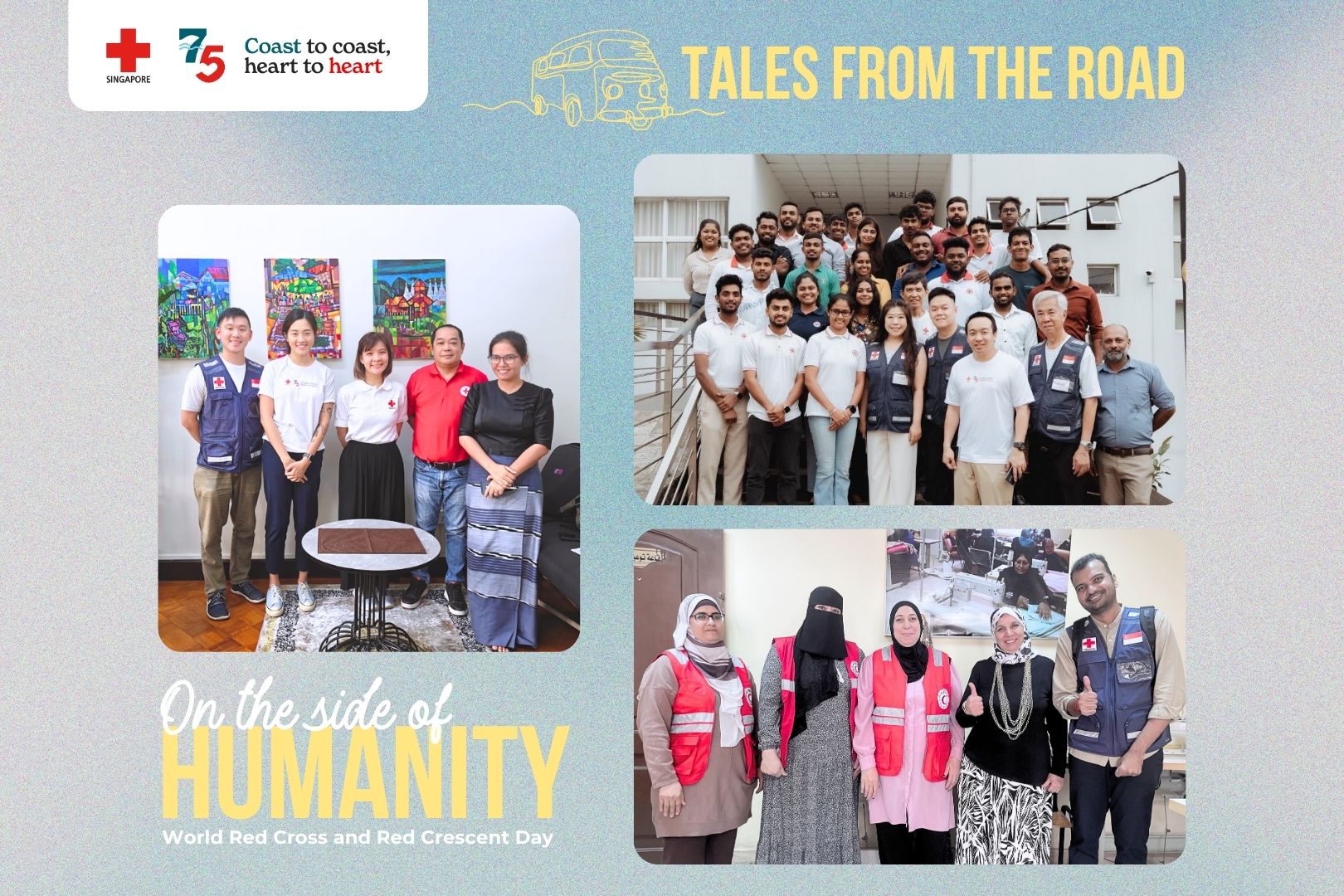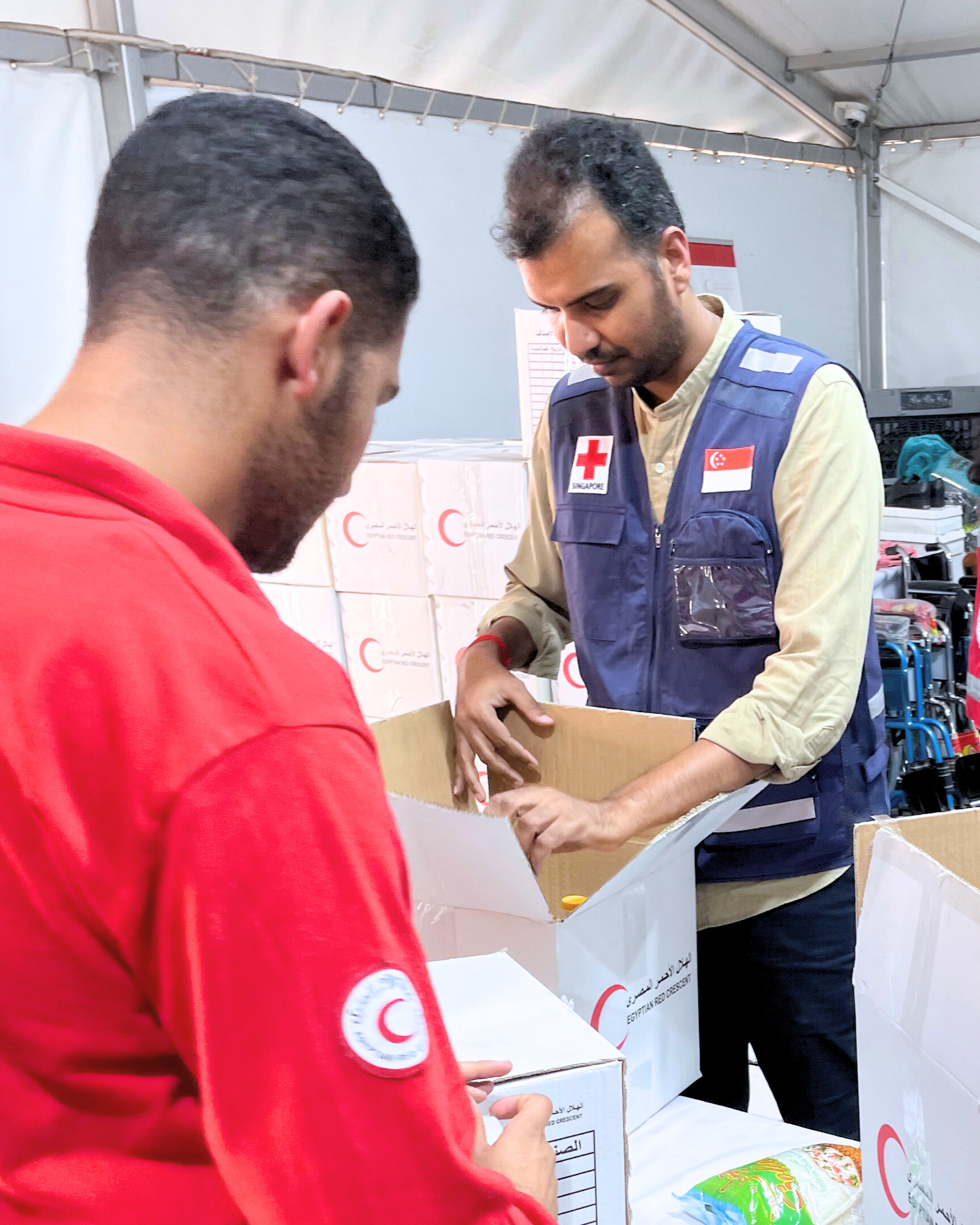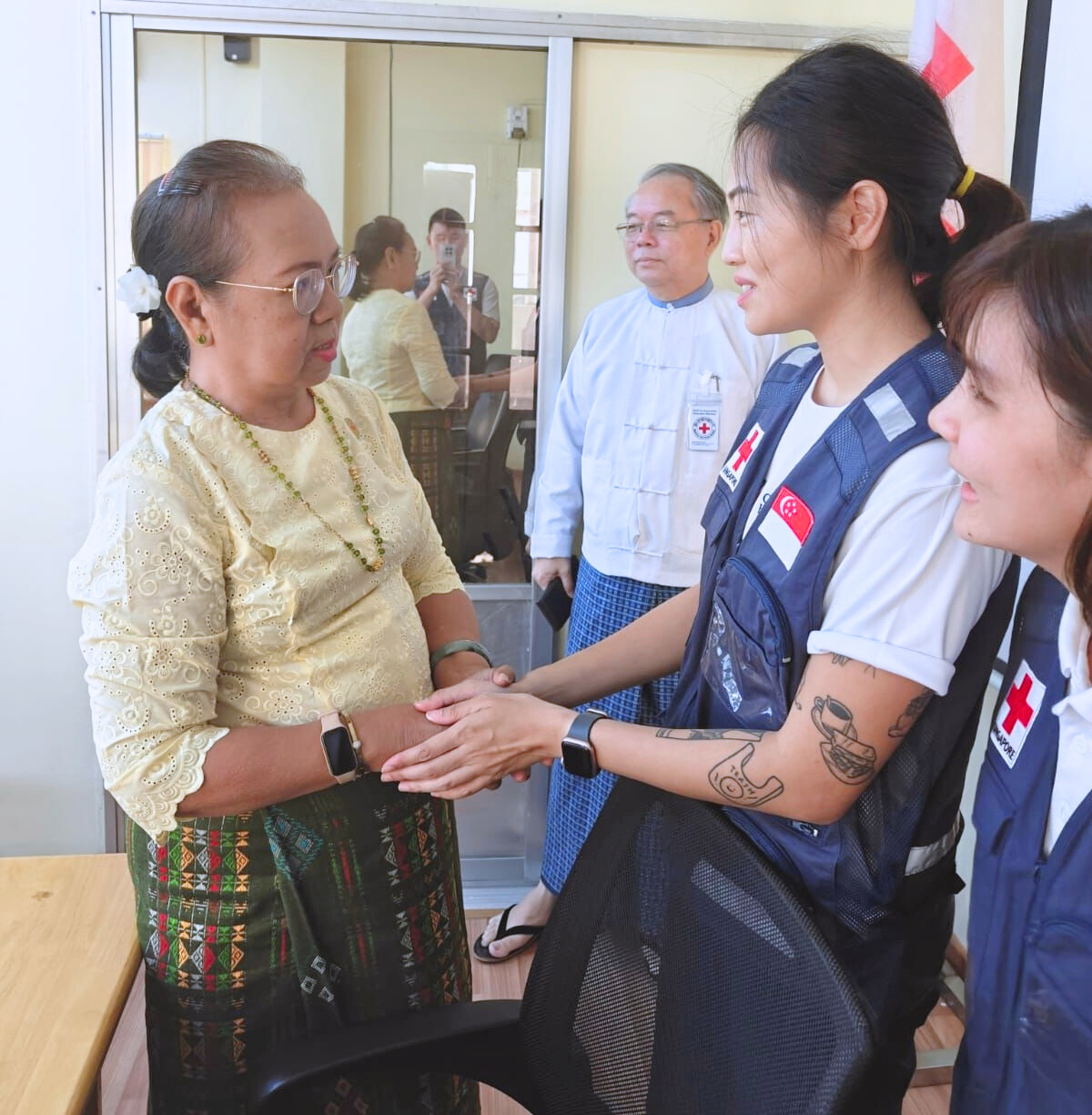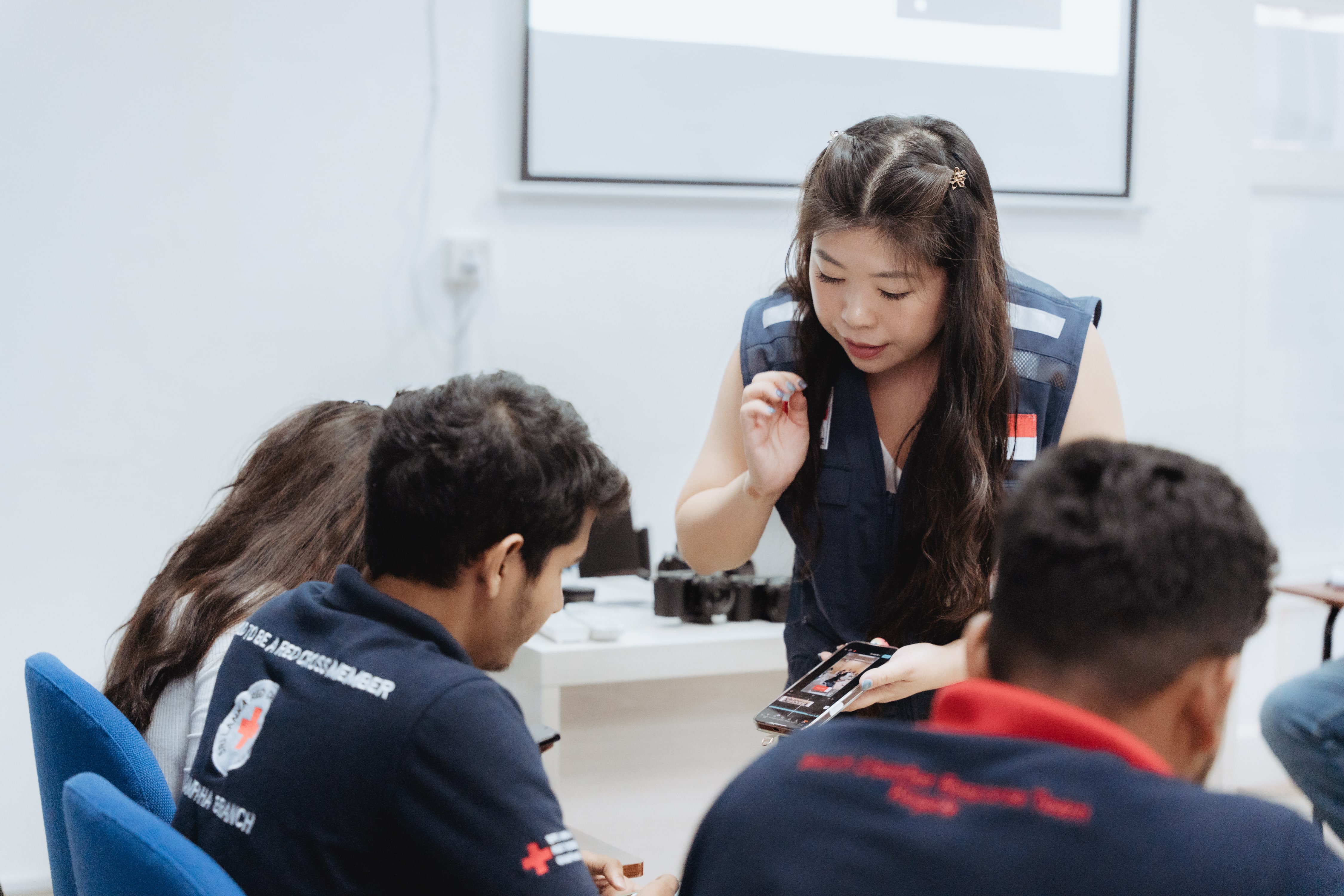
In commemoration of World Red Cross Day, we spoke to three brave individuals, who, despite their diverse backgrounds and roles, all share the same commitment to serving others. Read on to learn more about their experiences on the field, the lessons they've learned from these international missions, and what being part of the Red Cross family means to them.
DS Vickram, Egypt
I was following the news, but only started paying closer attention after my deployment was confirmed. It was difficult to see people displaced, injured and lacking basic necessities.
It wasn't a single moment but, rather, a gradual pull towards wanting to help where it matters most. And then the opportunity to contribute came along, and I decided to step forward.
In past missions, we were deployed as a team, and that team became your support system. You lean on one another and face challenges together. However, this time, it was a one-person deployment. I knew it was going to be a different experience.

There was fear, uncertainty and moments of self-doubt. But I've come to understand that courage doesn't mean the absence of fear; it's about moving forward with the fear, grounded by a sense of purpose and the belief that even one person can make a difference.
Deployments are fluid in nature, so I try to stay grounded by constantly realigning with the purpose of the mission and focusing on what needs to be done. The support from our Global Engagement colleagues before, during, and after the mission really help to keep us steady.
One image that stayed with me is seeing people, despite having lost so much, come together, sharing their food, and helping one another. It reminds me that amidst a crisis, there's still humanity, resilience and hope. However, more than images, it's the stories of resilience that stay with me.
Every deployment broadens your view of the world and it's humbling. You think you're going there to help, but often, the people you meet end up teaching you more than you could ever give.
One thing I've learnt is that you don't always need to have all the answers. What matters most is your willingness to serve, to learn and to connect. Sometimes, just being there and standing in solidarity speaks louder than anything else. If you have the capacity to help, you should — even in small ways. Don't be afraid to step forward to serve!
Gladys Tan, Myanmar
During the pandemic, I was doing over 60-hour work weeks and was extremely burnt-out. So I quit and decided to take a six-month break. After some much-needed rest, I started exploring opportunities again and came across an opening in what was then known as the International Services team at the Singapore Red Cross.
Working for humanitarian organisations has always been at the back of my mind ever since reading up about the aftermath of the Haiti earthquake. How the Singapore Red Cross has been at the forefront of the immediate response has left a deep impression on me and reaffirmed my desire to be part of a movement that brings real impact. So when I saw the vacancy, I applied right away and was genuinely thrilled when I got the offer.

During our recent five-day trip to Myanmar, we visited Yangon and Naypyidaw to better understand the needs on the ground and explore opportunities for further support. In Naypyidaw, we assessed temporary shelters and areas affected by the disaster; and witnessed firsthand how the Myanmar Red Cross was on the frontlines providing essential relief items and clean water to affected communities.
I travelled with Rebekah, Associate Director of Global Engagement and Jaron, a WASH volunteer, for this response mission. One particularly memorable moment was during the pre-trip preparations. Just a day before our flight, all three of us had to rush to the Embassy of Myanmar in Singapore to secure our visas. We received our approvals slightly less than two hours before the Embassy closed.
Seeing the aftermath of the earthquake firsthand was quite humbling. My heart truly went out to the people affected as it was a stark reminder that what we often take for granted, like access to clean water or a roof over our heads, are daily struggles for many. It really put things into perspective and made me reflect deeply on the realities others face.
Jaime Ong, Sri Lanka
The Overseas Humanitarian Programme (OHP), is organised during peacetime to assist communities in improving their living environment, conditions and quality. These are mission trips for which volunteer groups are deployed to build capacity and resilience in our sister national societies.
During this OHP trip, I was part of the team sent to empower the Sri Lanka Red Cross Youth and build their capacity in media training. We taught them how to fly drones and conducted both media and photography workshops based on the needs highlighted by their team. The Singapore Red Cross also gifted them drones and cameras to help them apply what they had learnt moving forward.
I was the only woman on a team of men! I travelled with Desmond from the Global Engagement department, alongside four other volunteer trainers for drone-flying, and one volunteer who is our trusty volunteer photographer, Boon Ping.
It was a delightful trip being part of a team who helped each other solve problems and genuinely looked out for one another. Plus, all the dinners we shared together were memorable — I love the Sri Lankan hoppers which are thin, bowl-shaped crispy pancakes and you eat it with curry. I also liked the Sri Lankan soft-shell crab - absolutely delicious!

One thing I hadn't anticipated was the extraordinary hospitality and enthusiasm of the youth volunteers from Sri Lanka Red Cross. They asked thoughtful questions, sought honest feedback on their current work, and were eager to improve how they showcased the work of the Sri Lanka Red Cross in their own Chapter. Their energy, curiosity and passion were infectious — it was a powerful reminder of why I love what I do, and how meaningful connections can transcend language, culture and borders.
Through this trip, I also discovered the unique challenges that other sister national societies faced. For example, in Singapore, we have an aging population that prior to visiting Sri Lanka, I thought was a universal issue. However, when I arrived in Sri Lanka, I realised this wasn't the case. There, the principal concern is Dengue fever due to the prevalence of stagnant water.
Through this mission, I learnt to broaden my perspective and understand how different places face different challenges. Similarly, in my personal life, I learnt not to limit myself to a fixed mindset, but rather to embrace different cultures and perspectives from everyone.
This is why World Red Cross Day is so important. Regardless of our various unique challenges or where we’re from — on WRCD, all Red Cross volunteers and staff unite in remembrance of our one mission: to help and serve others. This way, we’ll always be on the side of humanity

